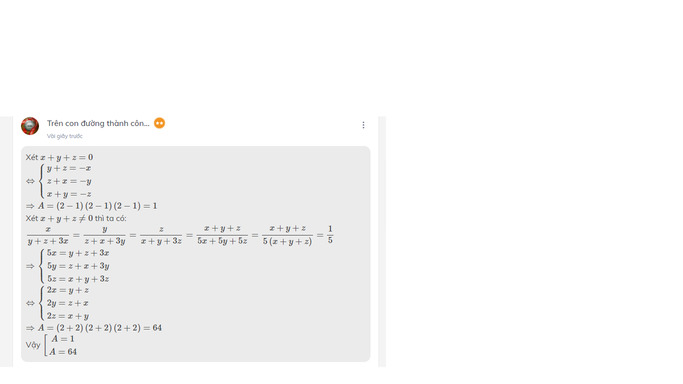tìm x,y thuộc Z thỏa x(x+y)+3x+3y là số nguyên
Hãy nhập câu hỏi của bạn vào đây, nếu là tài khoản VIP, bạn sẽ được ưu tiên trả lời.



Xét hàm \(h\left(t\right)=f\left(t\right)-m.g\left(t\right)\)
Với \(\left\{{}\begin{matrix}f\left(t\right)=\sqrt{3t^2+1}\\g\left(t\right)=t\\m=\dfrac{f'\left(\dfrac{1}{3}\right)}{g'\left(\dfrac{1}{3}\right)}=\dfrac{\sqrt{3}}{2}\end{matrix}\right.\)
Vậy xét hàm: \(h\left(t\right)=\sqrt{3t^2+1}-\dfrac{\sqrt{3}}{2}t\)
\(\Rightarrow h'\left(t\right)=\dfrac{3t}{\sqrt{3t^2+1}}-\dfrac{\sqrt{3}}{2}\)\(\Rightarrow h'\left(t\right)=0\Leftrightarrow t=\dfrac{1}{3}\)
Bảng biến thiên
Theo bảng biến thiên:
\(h\left(t\right)\ge\dfrac{\sqrt{3}}{2}\)\(\Rightarrow\sqrt{3t^2+1}\ge\dfrac{\sqrt{3}}{2}+\dfrac{\sqrt{3}}{2}t\)
\(\sqrt{3x^2+1}+\sqrt{3y^2+1}+\sqrt{3z^2+1}\ge\dfrac{3\sqrt{3}}{2}+\dfrac{\sqrt{3}}{2}=2\sqrt{3}\left(x+y+z=1\right)\)
Dấu "=" xảy ra \(\Leftrightarrow x=y=z=\dfrac{1}{3}\)
Trên mình tìm nhầm thành min gòi, mà bài này tìm max nên làm như này nhé
Vì \(x,y,z\in\left[0,1\right]\Rightarrow\left\{{}\begin{matrix}x^2\le x\\y^2\le y\\z^2\le z\end{matrix}\right.\)
\(\sqrt{3x^2+1}\le\sqrt{x^2+2x+1}=x+1\)
Tương tự:
\(\sqrt{3x^2+1}+\sqrt{3y^2+1}+\sqrt{3z^2+1}\le x+y+z+3=4\)
Dấu "=" xảy ra \(\Leftrightarrow\left(x,y,z\right)=\left(0,0,1\right)\) và các hoán vị của nó

Xét \(x+y+z=0\)
\(\Leftrightarrow\left\{{}\begin{matrix}y+z=-x\\z+x=-y\\x+y=-z\end{matrix}\right.\)
\(\Rightarrow A=\left(2-1\right)\left(2-1\right)\left(2-1\right)=1\)
Xét \(x+y+z\ne0\) thì ta có:
\(\dfrac{x}{y+z+3x}=\dfrac{y}{z+x+3y}=\dfrac{z}{x+y+3z}=\dfrac{x+y+z}{5x+5y+5z}=\dfrac{x+y+z}{5\left(x+y+z\right)}=\dfrac{1}{5}\)
\(\Rightarrow\left\{{}\begin{matrix}5x=y+z+3x\\5y=z+x+3y\\5z=x+y+3z\end{matrix}\right.\)
\(\Leftrightarrow\left\{{}\begin{matrix}2x=y+z\\2y=z+x\\2z=x+y\end{matrix}\right.\)
\(\Rightarrow A=\left(2+2\right)\left(2+2\right)\left(2+2\right)=64\)
Vậy \(\left[{}\begin{matrix}A=1\\A=64\end{matrix}\right.\)
Nếu bị lỗi thì bạn có thể xem đây nhé:


2.
a.
\(x^2+3x=k^2\)
\(\Leftrightarrow4x^2+12x=4k^2\)
\(\Leftrightarrow4x^2+12x+9=4k^2+9\)
\(\Leftrightarrow\left(2x+3\right)^2=\left(2k\right)^2+9\)
\(\Leftrightarrow\left(2x+3\right)^2-\left(2k\right)^2=9\)
\(\Leftrightarrow\left(2x+3-2k\right)\left(2x+3+2k\right)=9\)
| 2x+3-2k | -9 | -3 | -1 | 1 | 3 | 9 |
| 2x+3+2k | -1 | -3 | -9 | 9 | 3 | 1 |
| x | -4 | -3 | -4 | 1 | 0 | 1 |
| nhận | nhận | nhận | nhận | nhận | nhận |
Vậy \(x=\left\{-4;-3;0;1\right\}\)
b. Tương tự
\(x^2+x+6=k^2\)
\(\Leftrightarrow4x^2+4x+24=4k^2\)
\(\Leftrightarrow\left(2k\right)^2-\left(2x+1\right)^2=23\)
\(\Leftrightarrow\left(2k-2x-1\right)\left(2k+2x+1\right)=23\)
Em tự lập bảng tương tự câu trên
1.
\(\Leftrightarrow x^2-2xy+y^2=-4y^2+y+1\)
\(\Leftrightarrow-4y^2+y+1=\left(x-y\right)^2\ge0\)
\(\Leftrightarrow-64y^2+16y+16\ge0\)
\(\Leftrightarrow\left(8y-1\right)^2\le17\)
\(\Rightarrow\left(8y-1\right)^2\le16\)
\(\Rightarrow-4\le8y-1\le4\)
\(\Rightarrow-\dfrac{3}{8}\le y\le\dfrac{5}{8}\)
\(\Rightarrow y=0\)
Thế vào pt ban đầu:
\(\Rightarrow x^2=1\Rightarrow x=\pm1\)
Vậy \(\left(x;y\right)=\left(-1;0\right);\left(1;0\right)\)